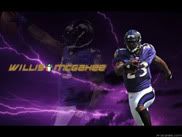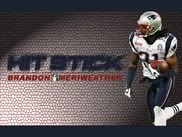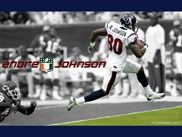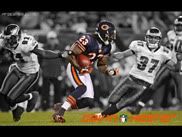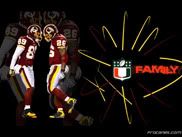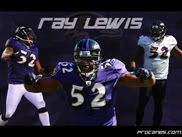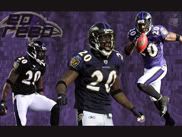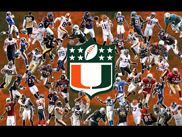CLICK HERE TO ORDER!
DJ Williams
D.J. Williams going to MLB?
Dec/15/08 01:05 AM

Williams, who's listed as probable, was playing inside on passing downs before his injury. Denver wants to keep rookie WLB Wesley Woodyard in the lineup and it could come at current MLB Nate Webster's expense. Denver could also move Webster to the strong side, replacing Jamie Winborn.
(rotoworld.com)
Williams downgraded on injury report, Webster Returns
Dec/05/08 07:58 AM

Broncos coach Mike Shanahan said left cornerback Champ Bailey and weakside linebacker D.J. Williams were downgraded during practice Thursday.
"A little bit tight for both of them," Shanahan said.
Williams has been out since suffering a third-degree sprain of his left medial collateral ligament against Miami on Nov. 6. Bailey and Williams did participate in practice on a limited basis Thursday.
The one defensive starter who will return this week is Nate Webster. The middle linebacker had been out since suffering a sprained MCL in his left knee on Nov. 6.
Webster had a second-degree sprain, which was not as severe as Williams' injury.
(denverpost.com)
D.J. Williams due back this week
Dec/04/08 08:04 AM

Williams, the best player on Denver's front seven, should immediately regain his full-time starting role from Wesley Woodyard. Woodyard was decent in Williams' absence, but D.J. offers more big-play and run-stopping ability.
(rotoworld.com)
Williams out for weeks
Nov/05/08 11:04 PM

It sounds like Williams tore his MCL. Rookie Wesley Woodyard (6'1/212), who some teams viewed as a safety prospect coming out in April, is highly unlikely to be as potent against the run as Williams (6'1/242). The Browns should be able to run off LT Joe Thomas' back all game Thursday night.
(rotoworld.com)
Broncos LB Williams injures MCL on tackle
Nov/03/08 01:49 AM

Weak-side linebacker and captain D.J. Williams went down with a knee injury in the fourth quarter of Denver's 26-17 loss to the Miami Dolphins. The injury happened as Williams tackled running back Ronnie Brown on a screen play.
Broncos coach Mike Shanahan said Williams injured the MCL in his knee. Shanahan indicated he didn't expect the linebacker to play Thursday in Cleveland.
"I can't give you a timeframe, but it will be a little while," Shanahan said.
(examiner.com)
Adaptable LB Williams shines amid Broncos' porous defense
Nov/02/08 07:15 PM

(profootballweekly.com)
Denver's Williams is AFC West player of week
Oct/07/08 08:01 AM

Denver's defense bounced back from allowing 113 points in the past three weeks and the Broncos beat Tampa Bay, 16-13. So, we're selecting a Denver defensive player for the AFC West player of the week: weakside linebacker D.J. Williams.
Williams was tremendous in Denver's solid defensive performance. Williams has been good all season and he kept it up Sunday. He had 11 tackles and one of Denver's three sacks. He also leapt high into the air to break up a long Tampa Bay pass play in the third quarter.
Williams is quietly one of the NFL's better linebackers. The 2004 first-round pick is making a strong case for his first Pro Bowl selection. Williams, who signed a long-term contract on the eve of the regular season, has preserved through some tough times. He has played all three linebacker positions. Williams is thriving now that he is back at his original NFL position.
(espn.com)
Broncos LB Williams finalist for award
Sep/23/08 06:45 PM
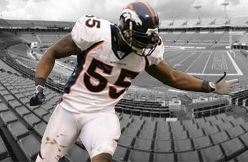
He is competing with Miami linebacker Joey Porter, a Colorado State product; Atlanta defensive end John Abraham; Philadelphia defensive end Juqua Parker; and Minnesota cornerback Antoine Winfield.
Fans can vote for the award until 2 p.m. MDT Thursday at NFL.com/gmc. The winner will be announced Thursday night at NFL.com.
Williams made a game-high 16 tackles in the Broncos’ 34-32 win against New Orleans.
Porter recorded three sacks, a forced fumble and six tackles (three for a loss) in the Dolphins’ 38–13 win over New England.
Abraham had two sacks in the Falcons’ 38-14 victory over Kansas City. He finished with three tackles and one forced fumble.
Parker had 2.5 sacks, five tackles (two of them for loss), a forced fumble, a pass batted down and four quarterback hits in the Eagles’ 15-6 win against Pittsburgh.
Winfield notched his first sack of the season, forced a fumble, recovered the ball and ran it back 19 yards for a touchdown that tied the score in the Vikings' 20-10 win against Carolina.
(rockymountainnews.com)
D.J.'s speed produced end of last drive sooner than Saints wanted
Sep/23/08 08:06 AM
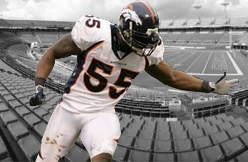
The play: The Broncos led 34-32, but the Saints had third-and-1 at the Denver 24 with 2:19 left. The Saints handed off to their short-yardage back, Pierre Thomas, who was tackled in the backfield by Broncos linebacker D.J. Williams for a 1-yard loss. On fourth-and-2, the Saints had Martin Gramatica try a 43-yard field goal. He missed, wide right, and the Broncos won.
Point/counterpoint: On the pivotal stop, the Broncos lined up eight players on the line of scrimmage, with Williams on their far right. Another Broncos linebacker, Jamie Winborn, was on the far left. Saints coach Sean Payton filed a complaint with the league saying Winborn lined up offside — and still pictures and replays suggest New Orleans has a beef. Someone should complain to Payton for not accounting for Williams, who was lined up fair and square and made the play even though it was run away from him.
"D.J. was free on the backside, and with his speed and quickness he was able to make the tackle on the backside," Broncos coach Mike Shanahan said.
Had the Saints gotten the first down, Payton said he would have run the clock down to about four seconds before having Gramatica attempt what would have been a shorter kick. Thus, the significance of Williams' play can't be underestimated.
Future prospects: Williams isn't resting on the fat, five-year contract extension he received two days before the season opener at Oakland. His 16 tackles against the Saints moved him from outside the NFL's top 45 tackle leaders last week to a tie for sixth this week with 28. His 14 solo tackles against the Saints were a career high, and one of his assists came against Thomas on a fourth- and-goal stop from the 1 late in the first half. It's early, but Williams has a great chance to make his first AFC Pro Bowl squad this season.
(denverpost.com)
Broncos' Williams may finally have found a home on weak side
Aug/20/08 10:42 PM

It's Thursday morning, and the Broncos defense is involved in a 7- on-7 red-zone drill with the Cowboys offense. Dallas quarterback Tony Romo drops back and delivers a swing pass to rookie running back Felix Jones, a 4.4-second burner and the nation's leader in yards per carry in 2007.
Jones heads for the sideline, his sights set on the left pylon, when Williams suddenly comes flying at Jones to cut off his angle and send him scurrying out of bounds about the 5-yard line.
"I just feel the position is suited for him," Denver linebackers coach Jim Ryan said of Williams' move away from the middle last year to the relatively wide-open spaces of his new spot. "That 'Will' linebacker is in space a little more and gives him the freedom to run."
At middle linebacker, the angles were completely different. And, perhaps worse yet for someone as athletically gifted as Williams, it was constricting in the sense he had to free himself from traffic before his speed and change-of-direction skills could be used fully. Nonetheless, Williams finished with an AFC-leading 141 stops, but there was an overriding sense the position wasn't natural.
So, in the offseason, Denver dumped Ian Gold, added Niko Koutouvides in free agency, shifted Nate Webster inside and cleared room for
Williams to return to the weak side, where he had earned a third-place finish in the 2004 Defensive Rookie of the Year voting.
In between, Williams also played strong-side linebacker, so his overall count stands at four positions in four years.
"Around Week 6 or 7 last season," he said, "I started enjoying the middle and I started picking it up, and that's why I was kind of a little upset about this switch, because right when I started getting good at it, I moved to another position."
Williams, though, hasn't completely abandoned the middle. In nickel looks, he still plays there. And if the tight end shifts on those passing downs, he might play strong side, too.
'Stressful' but beneficial
So, from a big-picture perspective, his vagabond life in Denver has served as a positive.
"I don't think people realize how difficult it is," Williams said, "but the upside to it is that, when I'm out there, I kind of know what everybody has to do now, just from playing 'Mike,' 'Sam' and 'Will.' . . . So I can kind of help other people."
He admitted all his switching has been "stressful," though, on the surface, one wouldn't know.
"I think that's because, one, I'm a team player and I want the team to win," he said. "But there are times where I felt, 'Are they moving me because I'm versatile and I can do this?' Or, 'Are they moving me because they think someone can play the position better than me?'
"Some of those things go through your head. But as long as every position I play I'm successful at, I don't mind."
Perhaps one drawback to his movement is that it has made it difficult to pin an exact value on Williams, which is important, considering he'll be the team's highest-profile free agent after this season.
The Broncos plan to reach out to Williams' representatives in the next couple of weeks to begin a dialogue on a new contract. But unlike Lance Briggs, Lofa Tatupu and other linebackers who recently have secured high-end contracts, Williams has yet to go to the Pro Bowl.
On the other hand, it's a chicken-and-egg scenario: Has all the moving denied Williams that opportunity?
Further, shouldn't he be rewarded for his willingness to sacrifice without any public groaning?
"I give a lot of praise to him," Broncos cornerback Dre Bly said, "because not a lot of guys can move around and still lead the team in tackles, play at a high level and make a lot of plays. D.J.'s done that. And he hasn't complained one bit.
"For myself, it's taken me years to learn my position, learn routes - and D.J., once he learns one position, he's switching to the next. He's done a tremendous job."
Bly envisions Williams at weak- side linebacker having the same type of impact, from a leadership and on-field perspective, as London Fletcher did when Bly won a Super Bowl with St. Louis in 1999.
"I heard what kind of guy Al Wilson was when he was here. We came out together, and I played with him at the Pro Bowl. And I know what kind of loss it was to the team when he left," Bly said. "I really feel like D.J.'s doing a great job filling his shoes and becoming the leader he needs to be for this football team to take off."
Happy in the Mile High City
Williams isn't ready to take off completely. His positional musical chairs notwithstanding, he admitted he has settled in Denver as a career locale.
"If the numbers are right and things are good, I would love to stay here," he said.
And even if contract talks filter into the season, Williams appears unconcerned that they might be a distraction.
"You know what? It's business and it's my life, so I have to talk about it eventually," he said. "I can't go throughout the day and not think about it, because it's there, it's going to happen."
Denver likely would have the salary-cap room necessary to consummate a deal this fall but would be creative in contract structure to be able to absorb the hit in guaranteed money. Williams, meanwhile, would have to be receptive to receiving split payments. But so far, flexibility, at least on the field,- has been the linebacker's calling card.
It's clear the Broncos, in part, are building their defense around Williams' skill set.
"He's a guy we can utilize on some blitzes, No. 1," defensive coordinator Bob Slowik said. "We're not afraid to have him either in zone or man coverage, because of his athleticism. So we're not worried about him on running backs, even the really good ones who can catch the ball out of the backfield. And then it's just him being able to fly from sideline to sideline and make plays in pursuit, where teams don't account for pursuit from the outside linebacker."
Felix Jones can attest to that.
(rockymountainnews.com)
Williams to play MLB on passing downs
Aug/17/08 10:29 PM

Williams, who wears the defensive headset to relay in signals from the sideline, will be an every-down player and maintain lots of big-play potential due to his versatility. If Denver lets him hit free agency next spring, other teams could view Williams as a full-time MIKE prospect.
(rotoworld.com)
Williams to wear defensive headset
Jul/29/08 04:47 PM
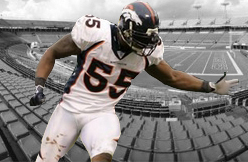
While Williams is no longer at the MIKE, he is playing for a contract and won't come off the field on third down, keeping him highly intriguing as an IDP. He will have the chance to make plays in coverage and should get 100 tackles.
(rotoworld.com)
ProFantasySports.com Ranks NFL Linebacker
Jun/16/08 06:35 PM

12. Jonathan Vilma, New Orleans Saints: Perhaps no Jet was as negatively affected by the hiring of head coach Eric Mangini as much as Vilma. At 230 pounds, Vilma is the lightest starting middle linebacker in the league (at least until rookie Jordon Dizon officially enters the lineup), and that fact is even more pronounced in a 3-4 defense. Such a scheme creates more traffic in the middle and allows more guards to get to the linebacker level. Vilma had trouble moving through the extra bodies to make his usual number of plays. As if that weren't bad enough, knee surgery ended his 2007 at midyear. If his knee is ready and holds up this year in the Saints' 4-3 scheme, Vilma — who led the league in tackles in 2005 — could outperform this ranking.
13. D.J. Williams, Denver Broncos: It has to be kind of tough being D.J. Williams. You come into the league and perform quite well as a rookie starter on the weak side. So, of course, the team brings back Ian Gold and shifts you to the strong side. Two years later, the team pulls the plug on middle starter Al Wilson and decides that you'd fit in well there. Despite some natural confusion in the new role, you rank second in the league in tackles in 2007. Obviously, it's then time for you to return to the weak side. Williams' new old role could well be the best spot for him. Although he's bound to face fewer tackle chances than in the middle, he could make more big plays (sacks, interceptions). At the very least, maybe he can finally settle into one role.
25. Ray Lewis, Baltimore Ravens: This might seem low on the list for Lewis, but the Ravens leader has played a full 16-game schedule just once in the past six seasons. At 33, Lewis can still get it done, though. His solo tackles were on pace for the low-to-mid 90s in each of the past two seasons, had he not missed two games in each. He's just a year removed from a career-high five sacks and has picked off two passes in two straight years. Nevertheless, durability is a worthwhile concern, as is the fact that he made five or fewer solo tackles in eight of 14 games in 2007.
DJ Williams, Nalen will have to wait
May/29/08 09:14 PM

Both are entering contract seasons. Nalen could re-up for another year next spring, but Denver has no reason to be aggressive with him as he comes off an injury and turned 37 in mid-May. Signing Williams will not be cheap.
(rotoworld.com)
Denver's Williams on the move again
May/21/08 06:56 PM
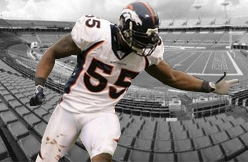
Williams came into the league in 2004 and he had instant success as a weakside linebacker. The first-round pick was a runner-up for the defensive rookie of the year. When Denver brought back Ian Gold in 2005, Williams was moved to the strongside for two seasons. Last season, Williams was moved to middle linebacker to replace the waived Al Wilson.
Williams started the season slowly and was often out of position. But he finished strong. Williams had 141 tackles, which was second in the NFL.
Still, the Broncos thought he'd be better off at his first NFL position. Thus, Williams is at the weakside again in wake of Gold being cut. Williams is a fine player but he deserves to have some stability. He was probably at his best on the weakside so it'll be interesting to see how he adjusts to yet another move.
(espn.com)
Broncos Player Helps Toddler With Leukemia
May/12/08 08:06 AM

Quentin is winning a year-and-a-half long battle with leukemia. He's beating odds that are stacked pretty high against him. Fifty percent of infant leukemia patients do not survive, but after six months in the hospital, and nearly a year of maintenance chemotherapy, Quentin seems to be doing just fine.
"There isn't a day that goes by that I don't count my blessings for how well he's doing," Jennifer added.
Jennifer is also thankful for the kindness of strangers. She's met others who know the impact cancer can have on a family.
"There as been such an outpouring of love and support," Jennifer told CBS4.
Now another mother is planning a fundraiser for Quentin. Not just any other mother, the mother of Bronco defensive linebacker, D.J. Williams.
"Being a parent and having your child go through this is tough and difficult, and people can use as much help as possible," Williams said.
Williams' mother wanted to help because as a child she had a brother who battled leukemia.
"My mother had a brother who passed away at 10 years old, and it's close and dear to her heart," Williams said.
"She didn't have to know us. She didn't have to know anything about Quentin. She didn't have to meet me to know that she wanted to do something for our family who has a child with cancer," Jennifer said.
It's the kind of connection that brings mothers together in the face of a difficult diagnosis.
The fundraiser is scheduled for Wednesday, May 14 from 2 to 4 p.m. at the Lighthouse Cafe in Parker. Broncos D.J. Williams, Nate Webster and Louis Green will be there to sign autographs and take pictures.
For those who can't attend the fundraiser but are still interested in helping the Martino family, Jennifer set up a PayPal account to take donations. The email address is caring4childhoodcancer@gmail.com.
For those who can't afford to make a donation, they can help Quentin and other children with leukemia and various types of cancer by making a blood donations. Quentin received more than 40 blood product transfusions during the course of his treatment. You can also sign up for the National Bone Marrow Registry.
The "Thanks Mom" Marrow Drive is going on at www.marrow.org where they are waiving the usual registration fees to be registered on the National Bone Marrow Registry May 5 through May 19. If Quentin ever needed a bone marrow transplant, he would have to get a non-sibling donor from the National Registry because he is an only child.
(cbs4denver.com)
D.J. Gets the Last Word
Apr/16/08 06:02 PM

First, to clear up any misconceptions about his successful first year as MLB, DJ stated he was more than comfortable playing MIKE in 2007 and liked running the defense from the middle.
“I enjoyed playing [MIKE] last year, I had fun. I thought I caught on well at the end.”
He also expressed his surprise at being moved bumped from that position this off-season. However, he’s a true team player and has agreed to the move for the team.
“I understand why I had to move; it made the team better. Sometimes you do things that are best for the team and it’s not best for you,”
Does that sound like a guy that’s happy about being demoted? Yeah, I didn’t think so.
But DJ is a professional and a throw-back to the good ole days. He’s a TEAM player and had nothing bad to say about the organization or his Coach.
“I haven’t been happy about the movement, but I like the organization, I like the cit. I love how coach Shanahan takes care of his players, as far as physically, the off-season program. Everybody around the facility, I like everybody.”
The second media point, beaten to a bloody pulp the last few months, was the fact that DJ was best over on the Weak Side. DJ seems to back that up… with a disclaimer.
“I feel like if I played one position all four years, I could probably be the top guy at my position or one of the top guys at the weak-side position. Changing every year kind of stunts your growth. But at the same time, I’ve got knowledge.”
Overall, I think this just verifies what we’ve been saying for months now. DJ wasn’t done any favors by being pushed to WILL from his leadership role in the middle. He was surprised and unhappy about it, but because he’s a team player he is willing make the move to improve the team.
In a league of ME FIRST athletes, it’s refreshing to see a guy like DJ choosing the team over his own personal glory. Compare the way he has handled this off-season against Javon Walker.
DJ had his best year (statically) and the spotlight of running the defense. Javon Walker had a gimped-up uneventful year. However, when both of these two were told to move to second-fiddle positions for the betterment of the team, Javon walked. DJ, however, decided that the team was more important than one man.
DJ play WILL this year – and probably earn himself a trip to Hawaii in the processes. But we’ll always know that his greatest attribute is not strength, agility or speed… it’s his selfless devotion to our Denver Broncos team.
(broncostalk.com)
Broncos' D.J. Williams ready for move to weakside linebacker
Apr/15/08 08:29 PM

Williams has played all three linebacker positions during his four-year career, and for 2008, he's going from middle linebacker back to weak side -- a position he played through college and in his rookie year of 2004.
Switching positions has been an every-year occurrence for Williams, but that doesn't mean it's been easy. Still, he knows that making the team better is priority one, even if it's not the best move personally.
Williams' size of 6-foot-1 and 242 pounds has made him a versatile guy in the Denver defense.
He moved to strong-side linebacker his second year, back to weak side in his third year, and last year he moved to the middle.
He says his strongest position is weak side, but by moving around he's made himself a valuable player.
(ap.com)
Moving D.J. Williams back to outside linebacker
Apr/04/08 05:49 PM
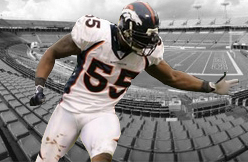
"It's tough to be thrown into a position and be great at it," Shanahan said of Williams' temporary shift to the middle. "I thought he did a good job. You look at all the tackles he had, but I just don't think it was really natural for him."
(denverpost.com)
DJ Williams Moves Back To the Weak Side
Apr/01/08 06:25 PM
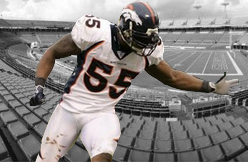
"I thought D.J. was a more natural (weak-side) linebacker," Shanahan said.
(milehighreport.com)
DJ Williams: Paradigm Shift
Mar/09/08 07:10 PM
In 2004 an interesting OLB prospect came into the draft
as a senior out of Linebacker U. He was fast (4.48
40yd, faster than most WR), freakishly agile (11.4 in
the 60yd shuttle, beating the benchmarks set for
coverage safeties) and unbelievably explosive (38"
vertical, higher than was expected out of CBs and WRs).
DJ Williams entered the draft with teammate Jonathon
Vilma as the top linebacking prospects, hands down.
Part of what set DJ apart was tremendous lower body strength, which gave him exceptional balance, heightened his agility and made him a powerful hitter. He was regarded as "instinctive in the gap", and a natural at reading his zone. In fact it was rare to find a dissenting opinion on his future greatness and potential. John Madden, who spoke at Williams High Scool team banquet remarked, "DJ is the only player I have ever seen who could go straight from highschool to the pro level." There was only one unanswered question in the minds of many scouts who watched DJ: "You will not see sixty minutes from him in any one game where he absolutely dominated," one NFL scouting director said. "But you see that he is still learning and progressing. You like to see that. I just wonder if he’ll ever be able to play up to his best all the time." Click here to continue reading...
Part of what set DJ apart was tremendous lower body strength, which gave him exceptional balance, heightened his agility and made him a powerful hitter. He was regarded as "instinctive in the gap", and a natural at reading his zone. In fact it was rare to find a dissenting opinion on his future greatness and potential. John Madden, who spoke at Williams High Scool team banquet remarked, "DJ is the only player I have ever seen who could go straight from highschool to the pro level." There was only one unanswered question in the minds of many scouts who watched DJ: "You will not see sixty minutes from him in any one game where he absolutely dominated," one NFL scouting director said. "But you see that he is still learning and progressing. You like to see that. I just wonder if he’ll ever be able to play up to his best all the time." Click here to continue reading...
